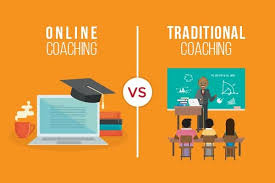The shift from traditional coaching methods to digital platforms marks a revolutionary change in how coaching services are delivered and experienced. This digital evolution is not just a response to technological advancements but a transformational movement towards online empowerment. It reflects a broader trend of digitization that has permeated every aspect of our lives, making knowledge and personal development more accessible than ever before.

1. Embracing the Digital Age
The advent of the internet and digital technologies has fundamentally altered the landscape of many industries, and coaching is no exception. Traditional face-to-face sessions, once the cornerstone of coaching, are increasingly complemented—or even replaced—by online interactions. This transition to digital platforms offers a wealth of opportunities for coaches to expand their reach and for clients to access guidance that might have been out of reach in the past.

2. Broadening Horizons
One of the most significant benefits of online coaching is its ability to transcend geographical boundaries. Coaches can now work with clients from across the globe, breaking down barriers that once limited their client base to their immediate locality. This global reach not only opens up new markets for coaches but also provides clients with a wider selection of experts, ensuring they can find the coach whose expertise and approach best match their needs.
Furthermore, the digital format offers flexibility that can accommodate the busy schedules of both coaches and clients. Sessions can be conducted anytime, anywhere, making coaching more accessible for people who may have struggled to fit traditional sessions into their lives. This convenience is a game-changer, making personal development a realistic goal for a broader audience.

3. Leveraging Technology for Enhanced Coaching
Digital tools and platforms offer innovative ways to enhance the coaching experience. Video conferencing apps bring the personal touch of face-to-face meetings into the digital realm, while specialized coaching software provides platforms for tracking progress, setting goals, and sharing resources. Social media and blogging allow coaches to share insights and connect with their audience on a wider scale, establishing their expertise and building trust with potential clients.
Moreover, online coaching can incorporate a variety of multimedia resources to enrich the learning experience. From interactive webinars to digital workbooks and online courses, the possibilities are endless. These resources can be tailored to individual learning styles, making coaching more effective and engaging.

4. Navigating Challenges
While the shift to digital coaching brings numerous advantages, it also poses challenges that must be navigated carefully. Building a strong coach-client relationship online requires effort and skill, particularly in establishing trust and rapport without the benefit of physical presence. Privacy and confidentiality are also paramount, with coaches needing to ensure that digital communications are secure and that client data is protected.
Another challenge lies in the digital divide—the gap between those who have access to digital technologies and those who do not. Coaches must be mindful of this divide and seek ways to make their services accessible to a diverse client base.

5. Looking to the Future
As we look to the future, the role of technology in coaching is set to grow even further. Emerging technologies like artificial intelligence and virtual reality hold the promise of creating even more immersive and personalized coaching experiences. The potential for AI-driven analytics to provide insights into client progress and for VR to simulate real-life scenarios offers exciting possibilities for the evolution of coaching practices.

Conclusion
In conclusion, the digital evolution has transformed traditional coaching into a dynamic field of online empowerment. By embracing digital platforms, coaches can reach a wider audience, offer greater flexibility, and leverage technology to enhance their services. However, this shift also requires careful navigation of the challenges posed by the digital realm. As we move forward, the integration of emerging technologies promises to further revolutionize the coaching industry, making personal growth and development more accessible than ever before.